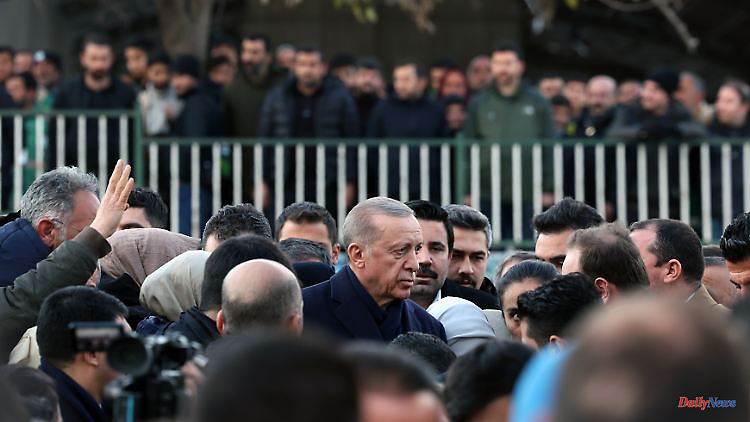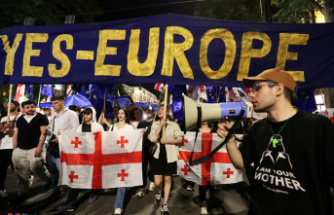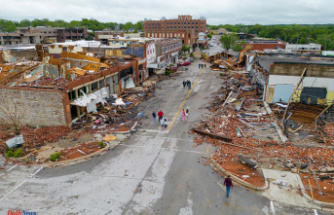The earthquake in Turkey killed tens of thousands of people. President Erdogan will find it difficult to deny responsibility for the scale of the disaster. His government and party not only ignored warnings, they also started a construction boom - and enriched themselves from it.
They had been warning for years, over and over again. But the decision-makers simply ignored their expertise: The earthquake in southeastern Turkey and northern Syria was foreseeable, criticized Hüseyin Alan, chairman of the Turkish Chamber of Engineering Geology, after the earthquake - once again. He has said several times that the earthquake-affected cities in Turkey have now been warned with detailed reports, including President Recep Tayyip Erdoğan and all relevant political decision-makers. He never received an answer. In the case of the city of Kahramanmaraş, the epicenter, the mayor would have even rejected further studies on earthquake safety, the scientist said. He simply did not see this as necessary.
Alan complains that the cities have been handed over to a certain lobby to be leased and plundered. Without naming the lobbyists, one thing is clear: he means the construction lobby, which is closely linked to the AKP government. The full extent of the accident cannot yet be assessed, but it is undisputed that the catastrophe did not come as a surprise to Turkey. Several tectonic fault lines run through the country and the 16-million metropolis of Istanbul in particular is considered to be particularly endangered due to its geographical location. This is where the Anatolian and Eurasian plates meet. And like everywhere else in the country, Ankara ignores this danger.
Just one example: In June 2021, despite considerable resistance from the opposition and environmentalists in Istanbul, construction of the second Bosphorus Canal began. This artificial sea route is a prestige project of President Erdoğan. The canal is intended to relieve the Bosporus of international shipping traffic. In addition, settlements with luxury apartments are to be built along its banks. In the event of an earthquake, seismologists warn, the artificial channel could make evacuations and logistical support even more difficult.
Scientists at the Geomar Helmholtz Center for Ocean Research in Kiel have identified such strong tectonic stresses in Istanbul that are sufficient to trigger an earthquake with a magnitude of 7.1 to 7.4. Should this happen, the consequences are likely to be similar to those of the August 17, 1999 earthquake, which had its epicenter in Gölcük, south-east of Istanbul. More than 18,000 people died at that time. Since then, Istanbul residents have been advised to store water supplies under their beds, and children should carry whistles with them so that they can draw attention to themselves in the event of a spill.
Despite the warnings, the problem is being treated negligently by the AKP and the largest opposition party, the CHP. In his 2019 election campaign, Istanbul Mayor Ekrem İmamoğlu (CHP), for example, criticized the AKP-led city administration for not making earthquake preparations. One of his campaign promises was to make the new buildings in the city more earthquake-proof. But because, according to media reports, the budget for earthquake safety was even reduced under pressure from the AKP, little has happened so far. Even without an earthquake, houses keep collapsing because apparently not even minimum standards were observed during their hasty construction.
While the housing market in the cities has been overexcited for years, this situation has worsened even more since the outbreak of the Ukraine war a year ago. Since 2018, anyone who invests in Turkey by purchasing a property worth several hundred thousand euros will receive a Turkish passport. This strategy is designed to attract foreign money into the country. The red crescent passport facilitates entry into the Schengen area and is therefore coveted by Russians whose access to Europe is restricted by sanctions. The passport investment is advertised with huge posters at Istanbul Airport or in luxury hotels such as the Hilton in Istanbul. Previously, buyers from the Arab world were particularly addressed, but such advertisements are now advertised in Russian.
As a result of the additional demand, the last gaps are being quickly filled, especially in Istanbul. As recently as December, the renowned geologist Naci Görür warned in a television interview with CNN Türk that an earthquake with a magnitude of at least 7.2 was expected in Istanbul. The risk that hundreds of thousands of people would then die is high. "It's not a joke," said Görür. He urged the authorities to take urgent action as soon as possible.
The current catastrophe is likely to have a significant impact on the forthcoming parliamentary and presidential elections. The quake is shaking Turkey in the midst of the worst economic crisis since Erdoğan and his AKP came to power in 2002. According to opinion polls published before the quake, he must be prepared for what is probably his toughest electoral battle to date. That's why the 68-year-old had expressed his wish last month to bring forward the dual elections from June 18 to May 14. A move that put the opposition under pressure, because the relevant opposition parties have not yet nominated candidates for the presidency or for the ministerial office. But in view of the devastating dimensions of the earthquake, the date for the votes is apparently also shaky. Erdoğan will have to answer many questions as to why this announced catastrophe could take on such proportions.
For example, what happened to the earthquake tax that has been levied since the 1999 earthquake? According to the opposition, these funds were misappropriated instead of being invested in building security. Why did the Turkish rescue teams sometimes arrive late in the disaster areas? Social media users and the few media critical of the government report that Turkish rescuers sometimes took days to arrive. Metin Ergun, MP for the opposition nationalist İyi Parti, described scenes from the Hatay region, on the border with Syria, which was particularly hard hit by the quake. "Hatay has become a ghost town. Everything is destroyed everywhere. There is no electricity. The rescue teams are completely inadequate," Ergun tweeted.
Who actually controlled the construction lobby, whose branch developed into the largest industry under Erdoğan, and which enriched itself hand in hand with the AKP from the high returns? It is clear that there were many buildings from the Erdoğan era that have now collapsed.
And why weren't all the scientists who warned over and over again about the tremors heard? Tayfun Kahraman, head of the Bureau of Earthquake Risk and Urban Development, warned in a report that up to 500,000 buildings could be damaged in a strong earthquake in Istanbul. After submitting his report to the government, he was sentenced to 18 years in prison in April 2022. He is said to have supported the Gezi protests.
Erdoğan is still unusually calm for his situation - unlike after the attempted coup in 2016, which he was able to use to his advantage. Perhaps he suspects that the quake heralded the end of his twenty-year reign. Or he is working on a strategy on how he could still win the elections.












